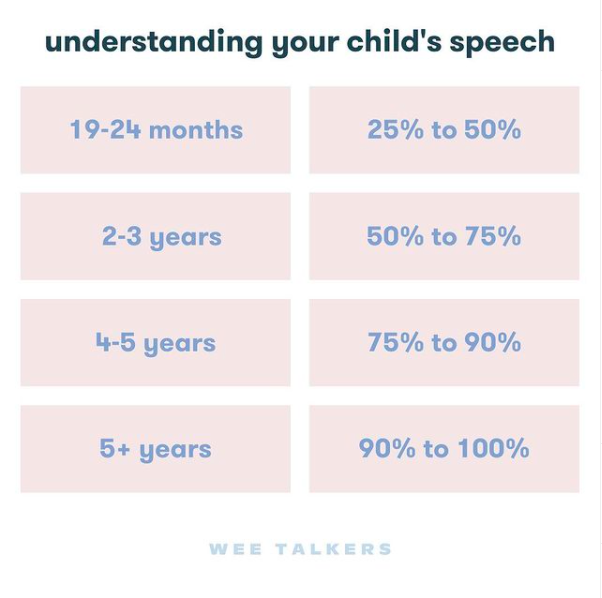Does My Child Need Speech And Language Therapy?
When you really stop and think about it, language develops very quickly. By the time our children start kindergarten, they’re able to communicate so well. Especially compared to the babies they were one second ago— before we blinked! But, when you’re worried about your child’s speech and language development, it can feel like they’re falling behind just as fast.
If you think your child may need speech and language therapy, we want you to know that you are not alone, you haven’t done anything wrong, and that there is help available. This post will help you figure out what milestones to watch for, what to do next, and when to see a speech-language pathologist.
Understanding Speech and Language
First, we need to talk about the difference between speech and language because the terms are often used interchangeably. Speech and language are definitely interconnected, but we still assess and analyze them separately.
Speech refers to how we say sounds and words. It’s a complex skill that takes time to develop. When they first start speaking, it’s typical for toddlers to not say every sound correctly. It’s also typical for others to not be able to understand everything they say.
Language, on the other hand, refers to the words we use and how we use them in order to convey meaning. Even children who can’t speak yet use language. For example, if you asked your toddler to point to a cow in their book and they could do it, they’d be using language skills. When our toddlers are very young, it’s most important to focus on their language skills. The more refined speech skills will begin to come with time.
How To Know If Your Child Needs Speech and Language Therapy
Your child will need speech and language therapy if they show signs of a speech and/or language delay or disorder. If you’re concerned about their development, start by paying attention to which age-appropriate speech and language milestones your child meets, and which ones they don’t (yet). If you think your child needs support from a speech-language pathologist, don’t hesitate to book an evaluation!
#1 Look For Signs Of A Language Disorder
According to the American Speech-Language-Hearing Association (ASHA), signs your child may need speech and language therapy because of a language disorder include:
Not smiling or interacting with others
Not babbling (4-10 months)
Making only a few sounds or gestures, like pointing (7-12 months)
Not understanding what others say (7 months-2 years)
Saying only a few words (12-18 months)
Not easily understanding words (18 months-2 years)
Not putting together sentences (1.5-3 years)
Struggling to play and talk with other children (2-3 years)
Having trouble with early reading and writing skills (2.5-3 years)*
* You may be wondering, “What are early reading skills?” Early reading skills include:
Making sounds or saying words when looking at pictures in books (1–2 years)
Pointing or touching pictures in books when you name them (1–2 years)
Turning pages in books (1–2 years)
Knowing that books have a front and back (2-3 years)
Enjoying books that have rhymes (2-3 years)
Pointing to and naming many pictures in books (2-3 years)
#2 Look For Signs Of A Speech Disorder
According to ASHA, signs your child may need speech and language therapy because of a speech disorder include:
Saying p, b, m, h, and w incorrectly in words (1-2 years)
Saying k, g, f, t, d, and n incorrectly in words (2-3 years)
Producing speech that’s unclear, even to familiar people (2-3 years)
Related: What To Do When You Can’t Understand Your Toddler
#3 Seek A Speech and Language Evaluation
If your child is missing milestones or showing any of these signs, we would recommend seeking a speech and language evaluation. They may need speech and language therapy to help them communicate to the best of their abilities.
Know that it’s never too early to seek out a speech and language assessment. We can tell you from experience that parents never regret going too soon. In fact, it’s the opposite. Many of the families we’ve worked with in our 25+ years as speech-language pathologists expressed to us that they regretted waiting as long as they did to get extra support. (That said, it’s never too late to get an assessment, either.)
When you do, a speech-language pathologist will be able to more specifically identify the areas within speech and language development that your child needs support with. Then, they’ll create an individualized plan to help them gain the skills they need.
Related: 3 Things To Know Before Your Toddler Starts Speech Therapy
Support Speech and Language Development At Home
A big reason why we started Wee Talkers was to make sure you could have access to quality speech and language resources, right from the start. To further your knowledge on how to support your child’s language development at home before, during, or after speech therapy, check out our blog, our Instagram page and our programs.
Your First Step: The Speech And Language Milestone Checklist
If you think your child might need speech and language therapy, it’s important for you to be aware of the milestones we would expect them to hit as they grow. Our free speech and language milestones checklist is an easy way to keep track of which skills they have and which ones might be coming next.



